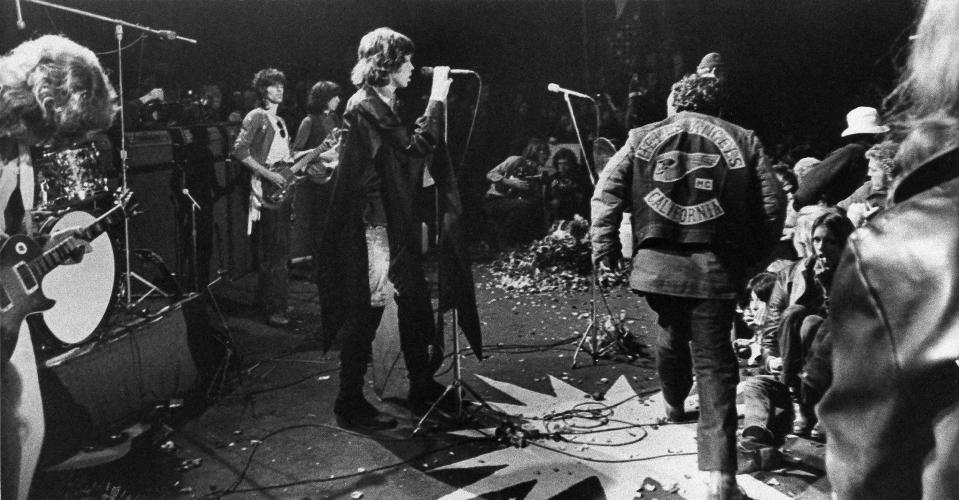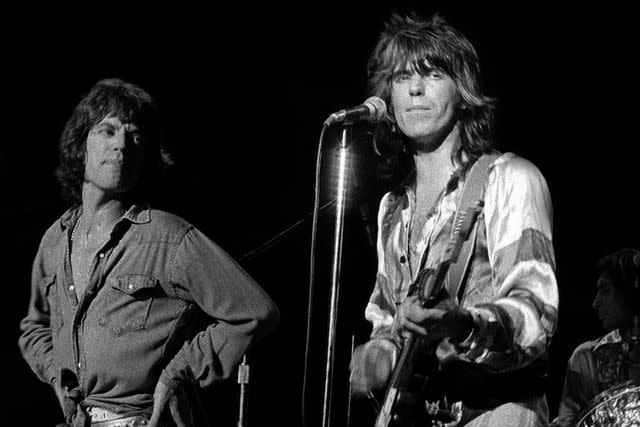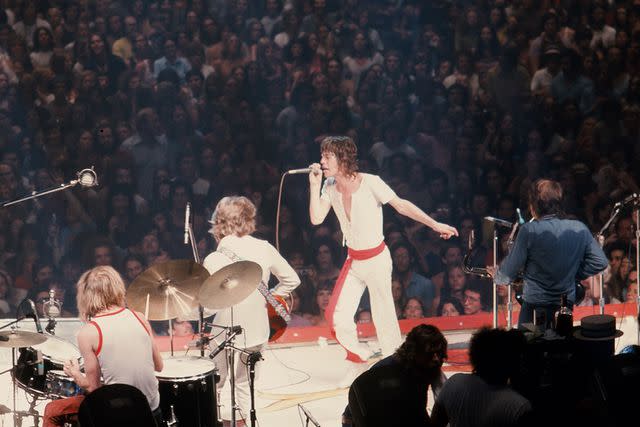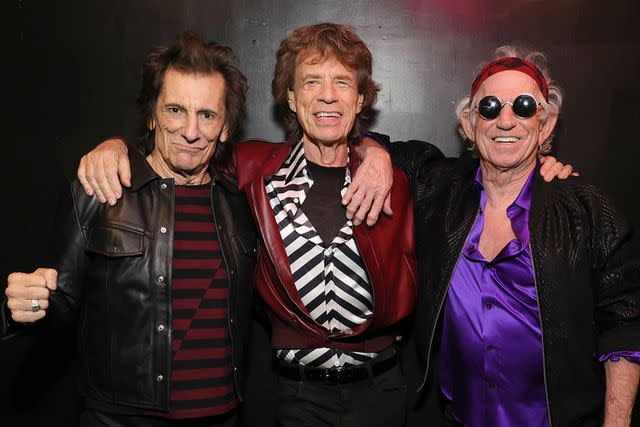Why the Hells Angels Were Once So Mad at the Rolling Stones There Were Fears They'd Try to Kill Mick Jagger
- Oops!Something went wrong.Please try again later.
- Oops!Something went wrong.Please try again later.
- Oops!Something went wrong.Please try again later.
- Oops!Something went wrong.Please try again later.
- Oops!Something went wrong.Please try again later.
A 1969 concert that ended in tragedy sparked a tense relationship between the motorcycle club and the British rock band

AP
Mick Jagger sings next to a Hells Angels member at the Altamont Speedway on Dec. 6, 1969.The Rolling Stones were burdened by more beasts than just their high-energy setlist when it came to their legendary 1972 tour.
As they trekked across North America, playing 48 shows over two months, Mick Jagger, Keith Richards, Bill Wyman, Charlie Watts and Mick Taylor found themselves on the Hells Angels’ bad side after a concert ended in tragedy, prompting fears that the motorcycle club was out for blood.
The tense rivalry between the two groups was well-documented by journalist Robert Greenfield, a onetime Rolling Stone editor who was granted behind-the-scenes access to the tour. He turned his experiences into the 1974 book S.T.P.: A Journey Through America with the Rolling Stones, which is now being revisited on the iHeartMedia podcast Stones Touring Party (streaming now), hosted and written by former PEOPLE staffer Jordan Runtagh.
The podcast draws from more than 60 hours of Greenfield’s never-before-heard interviews with the band, taped between 1972 and 1973 — and offers new insight into the safety fears that haunted the Stones throughout the tour.

Larry Hulst/Michael Ochs Archives/Getty
Mick Jagger and Keith Richards perform in San Francisco in June 1972.The British rockers had good intentions when they brought the Hells Angels on board as hired security for their December 1969 free concert at the Altamont Speedway in California. Legend has it that club members received $500 worth of beer as payment, and in return were expected to keep things orderly.
That didn’t happen, and things took a chaotic turn as the “security” quickly resorted to violence to keep the rowdy crowd in check. At some point, an 18-year-old Black fan named Meredith Hunter got into a racially motivated scuffle with members of the club — and when he pulled out a pistol in self-defense, was fatally stabbed.
The Stones saw the trouble, but didn’t realize Hunter had died. They continued on with the show, fearing a riot should they end their set early.
The aftermath of the fatal concert was a blame-tossing mess; the Stones were upset about being blamed for the chaos, while the Hells Angels were angry, as they felt the band had let them take the fall for Hunter’s death.

Robert R. McElroy/Getty
Mick Jagger performs in New York in July 1972.“I think it affected all of us very profoundly,” Taylor said in Greenfield’s tapes. “The thing we were upset about was being accused and held responsible for what happened. You can’t really blame anybody in that kind of mass hysteria.”
The fact that the band refused to cover the Hells Angels’ $50,000 in legal costs that came with the resulting murder trial angered them further — and before long, rumors were swirling that they were going to retaliate, by either murdering or kidnapping Jagger.
“People would say, ‘Mick, aren’t you worried?’” Jagger said in the tapes. “One time it really got me was after we decided to do the tour. We parked in a parking lot and these four girls came up, young girls… They said, ‘But aren’t you afraid of being shot?’ That really freaked me out. You know, they’re like, 15-year-old girls. So I said, ‘Yeah, I am.’”
Rattled, they played on. “Either I stopped touring or I didn’t. It was as simple as that…. Don’t say I wasn’t scared — I was scared s---less!” Jagger explained.
To keep threats at bay, the Stones beefed up their security measures, bringing two armed bodyguards into the fold, and taking care to travel via private planes and limos. When they stayed in hotels, they blocked off entire floors, making access available only to their entourage.
“Everyone was saying ‘Don’t eat the food!’” Wyman recalled. “I said to the promoter, ‘Have you tasted the food?’ And he said, ‘Yes, I’ve tasted everything. It’s alright!’ It was kind of a half joke and kind of a wary thing as well.”

Kevin Mazur/Getty
Ronnie Wood, Mick Jagger and Keith Richards on Oct. 19, 2023.Taylor, meanwhile, recalled the “rigorous” security measures in New York City, and said in the tapes that he was restricted to his hotel and the venue at which they played amid fears of danger.
“All I ever saw was the inside of my hotel room and the concert hall,” he said in the tapes. “I was told I couldn’t even go out shopping and I couldn’t order food from room service because somebody might slip into the kitchen and put poison in my curry…When you’re told things like that, what can you do?”
The rumors continued to swirl, and at one point, Jagger and Richards were served with a subpoena in San Francisco having to do with the club’s litigation against the band by a woman posing as a fan who was welcomed aboard their private jet (They promptly threw her and her paperwork off the plane and left town).
Of course, Jagger and co. made it through the tour unscathed. Hells Angels member Alan Passaro was eventually found not guilty of first-degree murder in 1971, after testifying he’d stabbed Hunter in self-defense, The New York Times reported.
Though Passaro died in 1985, the case remained open for years as investigators looked into rumors that a second person had been the one to actually stab Hunter. The case was officially closed in 2005, according to NBC News.
For more on the Rolling Stones, pick up the latest issue of PEOPLE, on newsstands everywhere now.
For more People news, make sure to sign up for our newsletter!
Read the original article on People.

